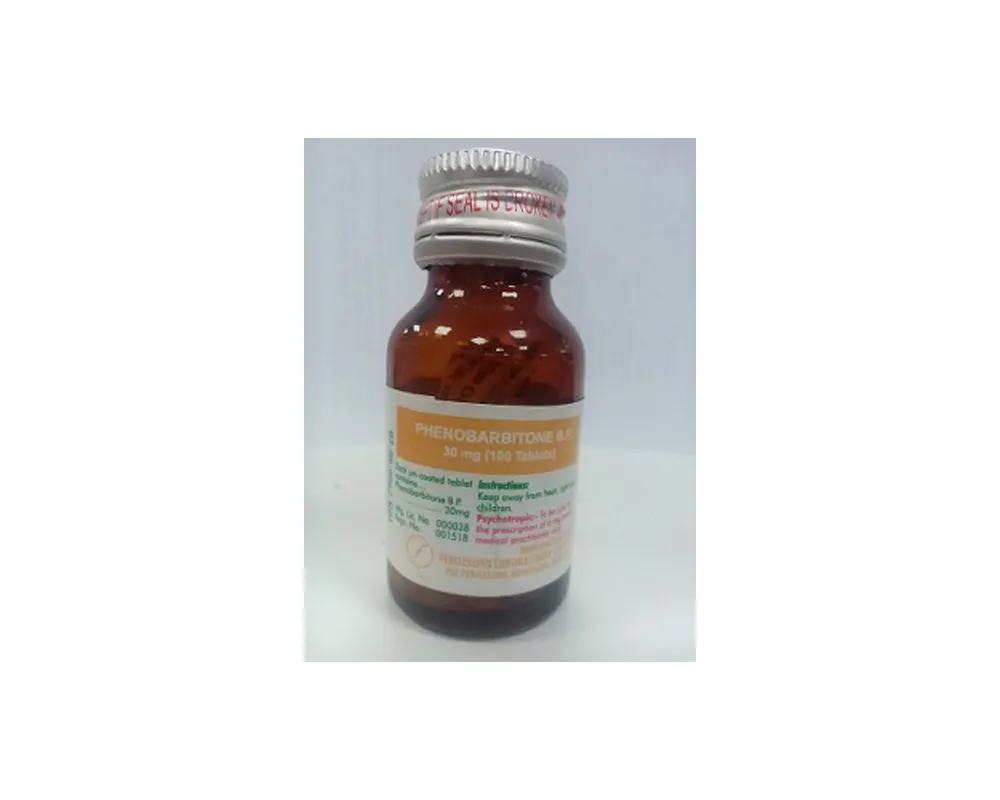Description
PHENOBARBITAL 30 mg Tablet contains Phenobarbital, a barbiturate that is primarily used as an anticonvulsant (anti-seizure medication) and a sedative-hypnotic. It is commonly used for the management of epilepsy (including generalized tonic-clonic seizures, partial seizures, and status epilepticus) and to treat anxiety, insomnia, and sedation. Phenobarbital is a central nervous system (CNS) depressant that works by enhancing the action of the neurotransmitter gamma-aminobutyric acid (GABA), which inhibits neuronal activity in the brain, resulting in calming and anti-seizure effects.
Therapeutic Class:
Anticonvulsant, Sedative-hypnotic
Active Ingredient:
Phenobarbital 30 mg per tablet
Indications:
PHENOBARBITAL 30 mg Tablet is indicated for:
- Seizure Disorders:
- Treatment of generalized tonic-clonic seizures, partial seizures, and status epilepticus in patients with epilepsy.
- Sedation and Anxiety:
- Used as a sedative-hypnotic for short-term treatment of insomnia or to relieve anxiety and restlessness in certain conditions.
- Alcohol Withdrawal Symptoms:
- May be used in the management of alcohol withdrawal seizures and to help in the detoxification process.
Mechanism of Action:
Phenobarbital exerts its effects by enhancing the action of GABA, a neurotransmitter that inhibits nerve activity in the brain. This results in CNS depression, leading to sedation, relaxation, and seizure control. By binding to the GABA-A receptor, Phenobarbital increases the duration of chloride ion channel opening, which in turn enhances the inhibitory effects of GABA. This action reduces neuronal excitability, preventing seizure activity and producing sedative effects.
Dosage and Administration:
- For Seizure Disorders:
- Adults: The usual starting dose is 60 to 120 mg/day divided into 1 to 2 doses. Dosage may be adjusted based on the patient’s response, typically between 60 mg to 200 mg per day.
- Pediatric Dose:
- Starting dose varies by age. Generally, for children, the dose is 3 mg/kg/day, divided into 2 or 3 doses, and adjusted according to clinical response.
- For Sedation and Anxiety:
- Adults: The initial dose for anxiety or sedation is typically 30 to 120 mg/day, adjusted based on the patient’s response.
- Alcohol Withdrawal:
- Dosing for alcohol withdrawal management should be individualized depending on the severity of symptoms.
- Administration:
- PHENOBARBITAL should be taken orally with water. It can be taken with or without food, but taking it with food may reduce the risk of gastrointestinal irritation.
Contraindications:
- Hypersensitivity to Phenobarbital or other barbiturates.
- Severe respiratory depression or severe hepatic impairment.
- Porphyria (a disorder of heme metabolism).
- Acute or chronic alcohol intoxication.
- Severe depression or suicidal ideation.
Warnings and Precautions:
- Respiratory Depression:
- Phenobarbital can cause respiratory depression and should be used cautiously in patients with respiratory diseases, such as COPD or sleep apnea.
- Dependence and Withdrawal:
- Phenobarbital is a habit-forming drug with potential for physical and psychological dependence. Abrupt discontinuation can lead to withdrawal symptoms, including seizures, anxiety, and insomnia. Discontinuation should be gradual under medical supervision.
- CNS Effects:
- Phenobarbital may cause drowsiness, confusion, and dizziness, particularly when combined with other CNS depressants (e.g., alcohol, benzodiazepines). Patients should be cautioned about performing tasks requiring full alertness (e.g., driving).
- Hepatic and Renal Impairment:
- Use with caution in patients with hepatic or renal dysfunction, as these conditions may affect the metabolism and elimination of the drug.
- Pregnancy and Lactation:
- Pregnancy Category D: Phenobarbital should only be used during pregnancy if the potential benefit justifies the potential risk to the fetus, as it may cause fetal harm (e.g., cleft palate, neonatal withdrawal symptoms).
- Phenobarbital is excreted in breast milk and may harm a nursing infant. It is generally recommended to avoid use during breastfeeding.
Adverse Effects:
Common Side Effects:
- Drowsiness
- Dizziness
- Ataxia (lack of coordination)
- Fatigue
- Irritability or mood changes
- Nausea and vomiting
Serious Side Effects:
- Respiratory depression
- Severe allergic reactions (e.g., rash, hives, difficulty breathing)
- Hepatic dysfunction (jaundice, elevated liver enzymes)
- Blood dyscrasias (e.g., thrombocytopenia, leukopenia)
- Suicidal thoughts or behavior
- Severe sedation or coma (especially when combined with other CNS depressants)
Drug Interactions:
- CNS Depressants:
- The sedative and CNS depressant effects of Phenobarbital may be enhanced when taken with alcohol, benzodiazepines, or other sedatives, leading to an increased risk of respiratory depression and sedation.
- Anticonvulsants and Antiepileptics:
- Phenobarbital may reduce the effectiveness of other anticonvulsants like phenytoin and carbamazepine, and its own effectiveness may be reduced by drugs like valproate.
- Oral Contraceptives:
- Phenobarbital can decrease the efficacy of oral contraceptives by inducing the liver enzymes that metabolize hormones.
- Warfarin:
- Phenobarbital may reduce the anticoagulant effect of warfarin, leading to an increased risk of blood clot formation.
Storage:
- Store at room temperature (15°C–30°C or 59°F–86°F).
- Keep the tablets in the original packaging to protect from moisture and light.
- Keep out of the reach of children.



Reviews
There are no reviews yet.